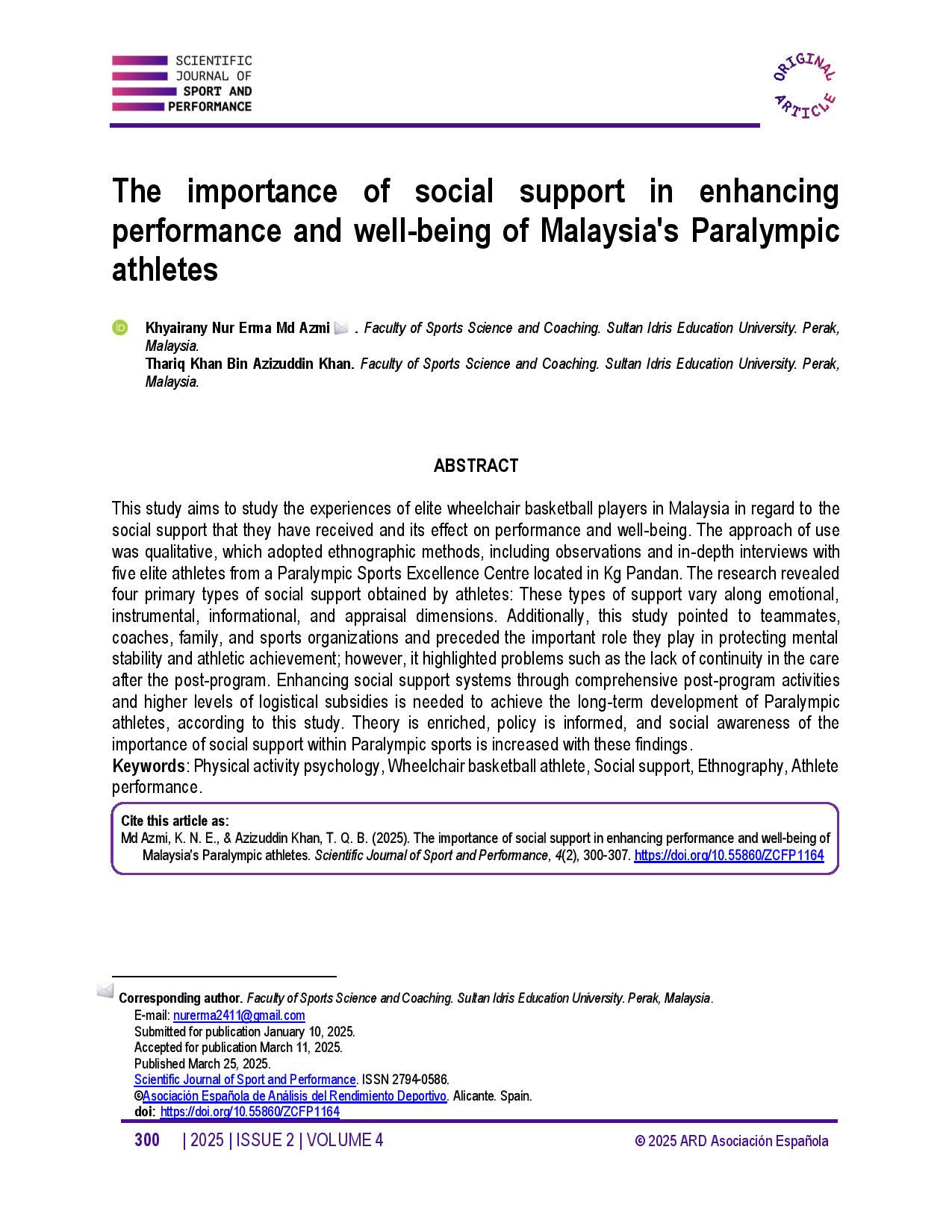The importance of social support in enhancing performance and well-being of Malaysia's Paralympic athletes
Main Article Content
Abstract
This study aims to study the experiences of elite wheelchair basketball players in Malaysia in regard to the social support that they have received and its effect on performance and well-being. The approach of use was qualitative, which adopted ethnographic methods, including observations and in-depth interviews with five elite athletes from a Paralympic Sports Excellence Centre located in Kg Pandan. The research revealed four primary types of social support obtained by athletes: These types of support vary along emotional, instrumental, informational, and appraisal dimensions. Additionally, this study pointed to teammates, coaches, family, and sports organizations and preceded the important role they play in protecting mental stability and athletic achievement; however, it highlighted problems such as the lack of continuity in the care after the post-program. Enhancing social support systems through comprehensive post-program activities and higher levels of logistical subsidies is needed to achieve the long-term development of Paralympic athletes, according to this study. Theory is enriched, policy is informed, and social awareness of the importance of social support within Paralympic sports is increased with these findings.
Article Details

This work is licensed under a Creative Commons Attribution-NonCommercial-ShareAlike 4.0 International License.
Funding data
References
Azmi, K., & Khan, T. (2024). An Analysis of the Effects of Social Support on the Performance of Elite Paralympic Athletes. International Journal of Academic Research in Business and Social Sciences. https://doi.org/10.6007/IJARBSS/v14-i2/20672 DOI: https://doi.org/10.6007/IJARBSS/v14-i2/20672
Bates, L., Kearns, R., Witten, K., & Carroll, P. (2019). 'A level playing field': Young people's experiences of wheelchair basketball as an enabling place.. Health & place, 60, 102192. https://doi.org/10.1016/j.healthplace.2019.102192 DOI: https://doi.org/10.1016/j.healthplace.2019.102192
Bogdan, R.C. & Biklen, S.K. 2006. Qualitative Research in Education: An Introduction to Theory and Methods. Boston: Allyn & Bacon.
Cardoso, V., Haiachi, M., Filho, A., & Gaya, A. (2018). The structural and human resources support for Brazilian Paralympic athletes. Journal of Human Sport and Exercise, 13, 873-883. https://doi.org/10.14198/jhse.2018.134.14 DOI: https://doi.org/10.14198/jhse.2018.134.14
Mandan, A., Tomoliyus, T., Alim, A., & Prabowo, T. (2024). The Impact of Service Quality on Self-Confidence of Wheelchair Athletes: An Analysis of Family Support as Moderator. Sport Mont. https://doi.org/10.26773/smj.240717 DOI: https://doi.org/10.26773/smj.240717
Merriam, S.B. & Tisdell, E.J. 2016. Qualitative Research. A Guide To Design and Implementation. San Francisco: Jossey Bass.
Mohajan, H.K. 2018. Qualitative research methodology in social sciences and related subjects. Journal of Economic Development, Environment and People 7(1): 23-4. https://doi.org/10.26458/jedep.v7i1.571 DOI: https://doi.org/10.26458/jedep.v7i1.571
Mousavi, A., Mohammadi, F., & Vaezmousavi, M. (2022). Psycho-Social Challenges of Iranian Paralympic Athletes. Humanistic Approach to Sport and Exercise Studies (HASES). https://doi.org/10.52547/hases.2.1.111 DOI: https://doi.org/10.52547/hases.2.1.111
Othman Lebar. 2017. Penyelidikan Kualitatif: Pengenalan kepada Teori Dan Metod. Tanjong Malim: Universiti Pendidikan Sultan Idris.
Zacharakis, E., Apostolidis, N., Kostopoulos, N., & Bolatoglou, T. (2012). Technical Abilities of Elite Wheelchair Basketball Players. The sport journal, 15.




